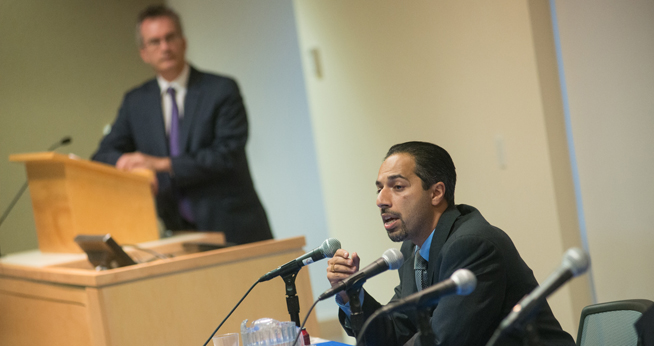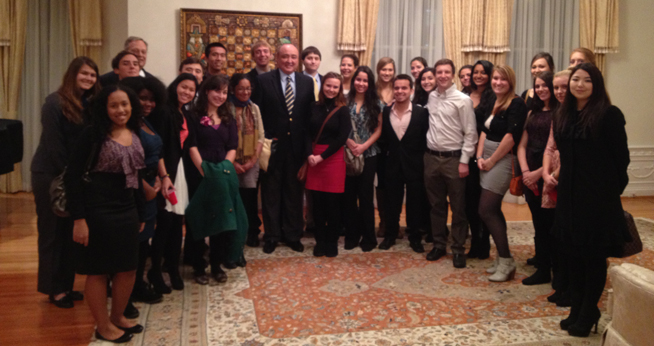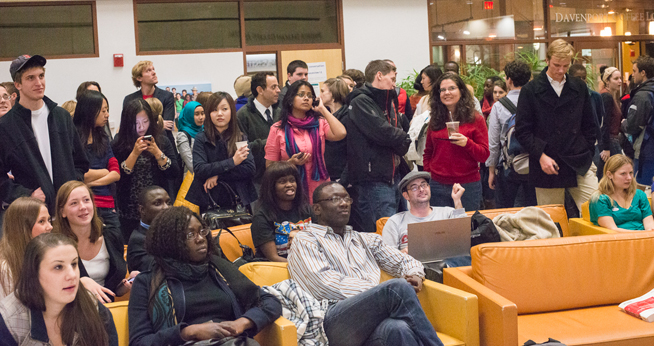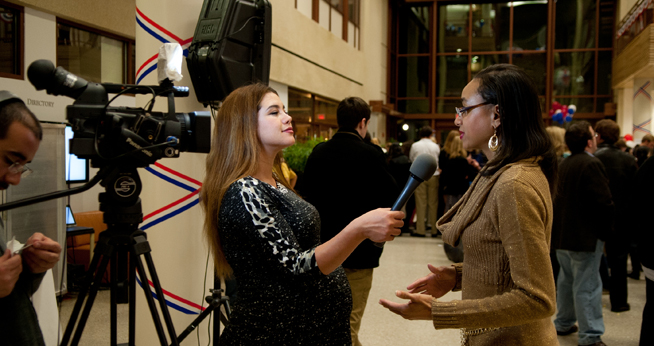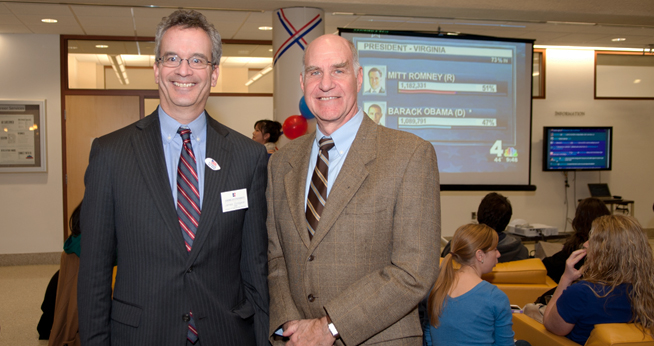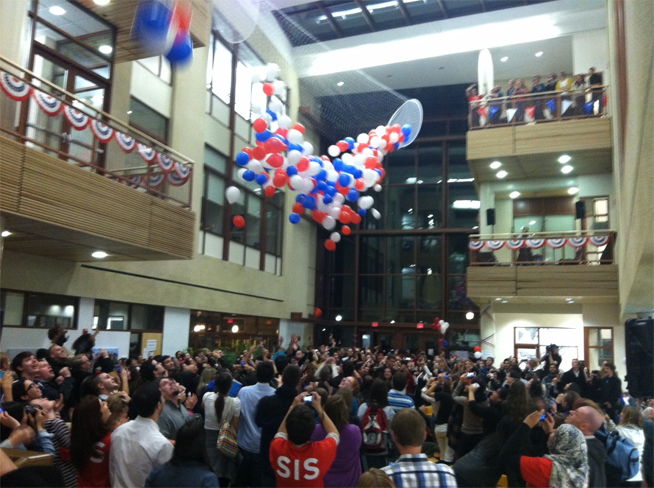 |
||||||||||||||||||
|
SIS Associate Dean Named D.C. Professor of the Year 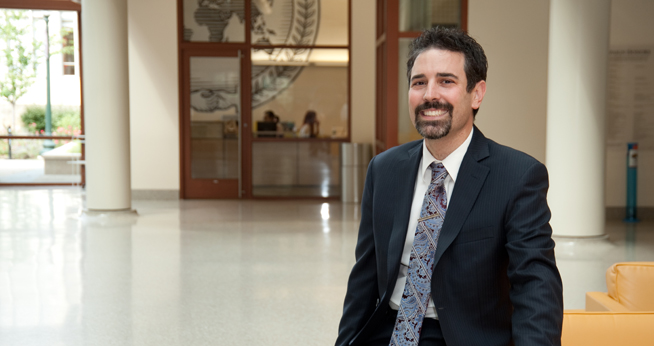
Patrick Thaddeus Jackson, associate dean for undergraduate studies at SIS, has been named Washington, D.C.'s 2012 undergraduate professor of the year by the Council for Advancement and Support of Education (CASE). Jackson and other awardees were honored at a reception in D.C. on Nov. 15. "Since I have always defined my vocation as being first and foremost a teacher, it is deeply gratifying to be recognized for my work with students over the years," said Jackson. "What we do as academics - what is distinctive about what we do, as compared with all the other knowledge-producing professions out there - is to provide occasions both inside and outside of the classroom for students to encounter ideas, concepts and arguments that unsettle their basic assumptions and promote intellectual growth. That's what I have always done in my teaching, and to be nationally recognized for doing so is one of the best votes of confidence I have ever received." The U.S. Professors of the Year program, launched in 1981, is sponsored by CASE and the Carnegie Foundation for the Advancement of Teaching. It is the only national program to recognize excellence in undergraduate teaching and mentoring. "Professor Jackson's enthusiasm for teaching and his commitment to the undergraduate experience at SIS and AU at large make him the ideal choice for the D.C. professor of the year," said Dean James Goldgeier. Jackson became associate dean for undergraduate studies last July 2012. He previously directed the AU's General Education program, overseeing the implementation of the university's liberal arts requirement. MORE HEADLINES - 11/20/2012
Professor Explores Climate Hardship in Nepal Professor Explores Climate Hardship in Nepal 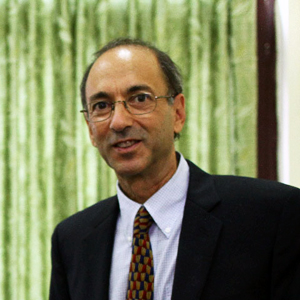
SIS Professor Paul Wapner traveled through Nepal last September for three weeks as part of an ongoing climate-change study. While in Nepal, Wapner met with subsistence farmers, shopkeepers and the country's minister of the environment and chief secretary of the government. "In climate change, we talk about mitigation - reducing carbon and transforming our energy systems - and adaptation, adjusting to a warmer world," said Wapner. "There's a third response. Inevitably there's going to be a lot of suffering. My project tries to understand also what that's about, and how climate suffering feeds into our mitigation and adaptation policies." As he traveled throughout Nepal, which he calls the "ground zero of climate change," Wapner studied the environment and how the Nepalese responded to climate shifts. "One of the things I'm learning is how people are actually experiencing climate hardship - like extreme drought, floods and landslides," he said. "The second thing I'm learning is people's understanding of change itself." He explained that the poor accept change more readily than those in the middle class because poor people are more vulnerable to events beyond their control. Wapner's sabbatical plans include more research in Indonesia and a visit to Corsica to study how island nations cope with climate hardships. He will also examine the effects of climate change closer to home - in New Jersey and New York, in the aftermath of Hurricane Sandy. "What we're seeing there is climate suffering," Wapner said. "It's irresponsible to point a causal finger at one event and say that it's climate change, but what happened in New York and New Jersey is what the models predicted. They're exactly like the scenarios we saw in Al Gore's movie, "An Inconvenient Truth," and what the Intergovernmental Panel on Climate Change has forecasted." However, the news isn't all doom and gloom, he said. "The bright spot of this is that there are different ways to experience and respond to climate suffering. My research finds that many people are expressing compassion, preserving a sense of justice and building stronger bonds of community in the face of severe hardship. Climate suffering is not necessarily about descending into a dog-eat-dog world." Scholars Discuss Israel, Iran and the Bomb
SIS's International Politics program and the AU Center for Israel Studies co-sponsored the forum discussion "Israel, Iran and the Bomb" on Nov. 12. The panel was moderated by Dean James Goldgeier. Participating experts included Trita Parsi, president of the National Iranian American Council; Natan Sachs, foreign policy fellow at The Brookings Institution's Saban Center for Middle East Policy; Michael Singh, managing director of the Washington Institute for Near East Policy; and SIS Professor Sharon Weiner. Most experts agree that Iran is in the beginning phases of nuclear capability. "U.S. intelligence officials are confident that Iran has no nuclear weapons program," said Parsi. "The regime has failed people - it could be more advanced and free than it currently is. Political repression has held them back." In response to Goldgeier's inquiry about how worried everyone should be about Iran, Weiner explained that nuclear energy and weapons programs are very similar in the first stages. "It all comes down to intent," she said. While countries can only speculate as to the state of Iran's nuclear capabilities, Sachs said, "there's no doubt that a nuclear Iran would be terrible for the world and for Israel." Parsi said that a nuclear Iran would, ironically, weaken the country's advantage. "If Iran builds a weapon, there is a risk of regional proliferation. Then Iran would lose its strategic advantage and strategic parity would occur." Still, Singh said, Iran is a long way from having a functional nuclear weapon, which reduces the chance that President Barack Obama will decide to strike the country. "Iran must weaponize the fuel and have a missile - a way to deliver it," Singh said. "Iran's challenge is - how do they get from where they are now to a weapon without provoking a strike? We don't want to take a position unless we absolutely have to. The U.S. and Israel want to avoid strikes if possible."
Wallander Named Fellow at German Marshall Fund 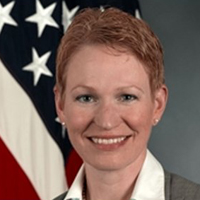
Last week, Professor and International Politics Program Director Celeste Wallander was named a non-resident transatlantic fellow of The German Marshall Fund of the United States (GMF). Wallander served as the former U.S. deputy assistant secretary of defense for Russia, Ukraine and Eurasia from May 2009 to July 2012. She was the principal advisor on the region to the secretary of defense. "Professor Wallander's appointment will help foster stronger ties between SIS and the German Marshall Fund, and we are pleased that the GMF has recognized her outstanding expertise in Russia and Eurasia," said Dean James Goldgeier. As part of the GMF's Foreign Policy Program, Wallander will concentrate on Russia, the South Caucasus, Ukraine and Belarus. The GMF also monitors Russia's relationship with Asia and Eastern European energy issues. "Celeste's entire career has been devoted to better understanding Russia, a critical actor in the world and in transatlantic relations," said GMF President Craig Kennedy. "Drawing on her experience in both academia and government, she will add a new dimension to GMF's work on Russia and its region." GMF was founded in 1972 to strengthen transatlantic cooperation in the spirit of the Marshall Plan. Jake Sullivan, State Department Policy Planner, Visits SIS
The world is changing. Power shifts, new technologies and a host of other factors are transforming the international arena. And, according to Jake Sullivan, director of policy planning at the U.S. Department of State, the United States needs to keep up with those changes while still maintaining its leadership role. During a talk organized by the Transnational Challenges and Emerging Nations Dialogue (www.transcend-global.org) at the School of International Service on Nov. 8, Sullivan discussed the foreign policy model implemented by Secretary of State Hillary Clinton and President Barack Obama. For the past four years, Sullivan has traveled to 112 countries with Clinton and seen the role of the U.S. in the world "up close and personal." The Obama model is based on three premises: that the U.S. still has great convening power, that other countries still look to it for leadership and that the world is changing. Sullivan highlighted the importance of U.S. involvement in world issues. "While it is true that no global challenge can be solved by any one country, no global challenge can be solved without us." The U.S. can't rely on old tactics in its leadership role, though. "The key point is that effective leadership has to look different than it did 20 years ago because the world looks different," said Sullivan. He described four core values that will fulfill the task. The first is "leadership with purpose." Sullivan said the U.S. needs to look beyond its own self-interest, adding that the country should be driven by the desire to be on the right side of history. This is especially important after recent wars left some people with the impression that the U.S. was not their friend, he said. The second value is "leadership through burden sharing,"or striving for mutual responsibility, respect and dialogue. A good example of burden sharing, Sullivan said, was having multiple countries put sanctions on Iran instead of the U.S. imposing sanctions solo. The third value is "leadership through enforcement of the rules," Sullivan said. The U.S. must keep the international order. Professor Amitav Acharya, UNESCO Chair in Transnational Challenges and Governance and director of TRANSCEND at SIS, added that the biggest challenge for U.S. foreign policymakers in the coming decades will be how to deal with rising powers who want changes in international decision-making structures and rules. "Leadership by example" is the final value. "This means we need to put the house in order," said Sullivan, referring to building a strong economy and political consensus. Sullivan is optimistic that by using these guidelines, the United States can still do a lot for the rest of the world. "I have become jaded about many things in my job, but one thing I haven't become jaded about is getting off that plane and thinking of what we can deliver to that country," he said. About 800 students, staff, faculty, alumni and AU neighbors attended the election night watch party in the SIS atrium Nov. 6. Washington, D.C.'s NBC4 and media outlets from Germany, Slovakia, Morocco, Saudi Arabia, France, Bangladesh and Sweden covered the event, which featured raffles, a trivia contest and a balloon drop.
Class Notes We invite readers to send comments to SISComm@american.edu. Please include your graduation year and degree.
Dana Boyle, SIS/BA '98, a principal of Boyle Law Firm, Kenosha, Wisc., has been named to the Wisconsin Rising Stars 2012 list of the top up-and-coming attorneys in Wisconsin. Each year, no more than 2.5 percent of the lawyers in the state receive this honor. Grace Chung, SIS/BA '07, is working for IBM. Sun Shin, SIS/BA '07, is pursuing her master's degree at Harvard University. Amanda Lotz, SIS/BA '11, now works for Accion International. Chelsea Crandall, SIS/BA '12, holds the position of junior professional associate for the World Bank. Alexandra Golomb, SIS/BA '12, is a marketing coordinator for Discovery Communications. Sarah McHaney, SIS/BA '12, works for PBS. Christopher Regacho, SIS/BA '12, works for Credit Builders Alliance. "As a returned Peace Corps Director (Cameroon 1979-81) and AU Alumna, I was fascinated with the article by Stephen W. Angelsmith ["The Peace Corps and SIS - The Partnership Grows," Nov. 6]," wrote Constance Freeman, SIS/BA '68. "This is an excellent communication - informative and concise. Thank you," wrote Ian Davies, SIS/BA '93. AU Update hit inboxes on Monday, Nov. 19. Did you receive your copy? If not, be sure to update your contact information with AU Alumni Relations at www.american.edu/alumni. Both Allison Silberberg, SIS/BA '84, and Kirk Acevedo, SIS/BA '11, are featured. Getting to Know You - Robin Broad 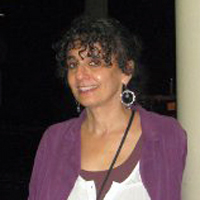
Job Title: Professor, International Development Job Duties: I teach undergrad and grad international development courses in two main areas: environment and development, and economic globalization and development. The latter focuses on global-local links - for example, the impact of investment or of trade on the ground in economic, environmental and social terms. I am very lucky because what I teach is related to my research and to my policy and advocacy work. I care about these issues passionately, as do my students. How long have you worked at SIS: Since 1990. What would your colleagues be surprised to know about you: I won my high school's Betty Crocker Homemaker of the Year Award! The best part of working at SIS: Classrooms filled with highly motivated students from all over the world who want to do their part to make the world a better place. Students who care not just about international studies, but about international service. My first job: I was a bank teller in high school. But my first job after getting my Ph.D. was as an international economist in the U.S. Treasury Department. Ronald Reagan was president, and my first boss was Donald Regan, followed by James Baker. I left the Treasury Department for Capitol Hill, where I worked on international economic issues for Chuck Schumer. Where I grew up: Manchester, New Hampshire - once the site of the largest cotton mill in the world. Family: My husband John Cavanagh and I met in graduate school; we were both research assistants for Richard Falk. John and I have a 15-year-old son, Jesse Broad-Cavanagh, who is an avid Ultimate Frisbee player. What I enjoy doing on the weekends: I love to walk along Sligo Creek in Takoma Park. What I'm reading these days: David Corbett's Blood of Paradise - I tend to read books related to where I'm doing fieldwork. Favorite book: I am a huge fan of narrative non-fiction. My favorite authors have long included Barbara Ehrenreich and Adam Hochschild (King Leopold's Ghost: A Story of Greed, Terror, and Heroism in Colonial Africa, for example), and more recently, Katherine Boo (Behind the Beautiful Forevers: Life, Death, and Hope in a Mumbai Undercity). Favorite D.C. hangout: My office, of course. Beyond my office, Malaysia Kopitiam for its baby-oyster omelets and shaved ice dessert and Las Canteras for its ceviche. Favorite food: Very hard to choose between Salvadoran pupusas and Philippine sinigang na hipon (sour shrimp soup). Last vacation: I love to spend my vacation time in places off the beaten track, in ordinary farming and fishing villages in countries where I am doing research. So my last vacation was at a little fishing village in southern El Salvador. 
Professor Jordan Tama's op-ed " Sorry, Senators. An independent panel is the best way to investigate Benghazi." appeared in the Washington Post, Nov. 16. Professor Amitav Acharya's opinion piece, "What Obama's Second Term Means for Asia," appeared in East Asia Forum, Nov. 11. Professor David Mislan: Interviewed regarding General Petraeus's resignation, WNEW 99.1, Nov. 9. Professor Gordon Adams' opinion piece, "How'd That Defense Jobs Circus Work Out for You?," appeared in Foreign Policy, Nov. 8. Professor Loubna Skalli-Hanna: Interviewed in "Info Soir: Mardi 06 novembre," 2M (Morocco; 5:02), Nov. 6. 
Professor Gordon Adams' opinion piece, "Fiscal Cliff Notes," appeared in Foreign Policy, Nov. 6. Professor Quansheng Zhao: Interviewed in "U.S.-China Diplomacy," NHK World (Japan), Nov. 6. Professor Robert Pastor's opinion piece, "Carter's Legacy Instructive to Candidates," appeared in Guam Pacific Daily News, Nov. 5. Professor Gary Weaver's opinion piece, "Obama the Realist vs. Romney the Idealist," (with Theodore Couloumbis and Bill Ahlstrom) appeared in Real Clear World, Nov. 3. Professor Robert Pastor's opinion piece, "Is Obama Like Carter as Romney Says?" appeared in USA Today, Nov. 1. 
Professor Dan Schneider participated in a panel event, "The Law of Cyber Warfare: Can the Current Legal Regime Hack It?" at AU's Washington College of Law on Nov. 8. Ibn Khaldun Chair of Islamic Studies Ambassador Akbar Ahmed delivered a lecture, "Islam in America: Challenges and Opportunities," at the Woolf Institute's Centre for the Study of Muslim-Jewish Relations at the University of Cambridge (England) on Nov. 8. 
Ambassador Dennis Ross and Dean James Goldgeier will discuss "U.S. Policy in the Middle East in the Next Administration" Monday, Nov. 26, at 2 p.m. in the SIS Abramson Family Founders Room. The event is open to the public. Assistant Secretary of State for International Security and Nonproliferation Thomas M. Countryman will speak on "Next Generation Proliferation Challenges: Looking Ahead" Monday, Nov. 26, in SIS Room 300 from 3:30 p.m. - 5:30 p.m. The event is free and open to the public. Professor Celeste Wallander will discuss "Women in Defense and Security Policy" Monday, Nov. 26, from 6:30 - 8 p.m. in the SIS Abramson Family Founders Room. During the 2008 Obama campaign, Wallander served as a member of the small team of advisors who wrote the administration's strategy for U.S. relations with Russia and Eurasia. When she joined the Pentagon in May 2009, she became part of the team that developed and implemented the policy. The event is free and open to the public. The Social Enterprise program will sponsor a workshop on design thinking Saturday, Dec. 1. The workshop is open to the public; fees are $15 for students and $25 for professionals. Visit the workshop's Facebook page (www.facebook.com/DesignThinkingWorkshop) for information on locations and registration. SIS will host a Graduate Practica Symposium Saturday, Dec. 1, from 1 p.m - 4 p.m. in the SIS Abramson Family Founders Room. The symposium will feature SIS graduate student teams who have worked with partners in the federal government, nonprofit and business world to provide program and policy analysis. This fall's symposium features projects prepared for partners at the U.S. Department of State, the Defense Intelligence Agency, Abt Associates and the National Security Council. The event is free and open to the public. National Director of Financial Services Communication Stan Collender; Program Examiner for the Office of Management and Budget's National Security Division David Glaudemans; and Majority Professional Staff Member of the Senate Appropriations Committee's Subcommittee on Defense Katie Kaufer will join moderator SIS Professor Gordon Adams on Wednesday, Dec. 5 from 3:30 p.m. - 5 p.m. in SIS Room 300 for the panel discussion "Defense and the Federal Budget Follies: Over the Cliff, Grand Bargain or Kick the Can?" The event is free and open to the public. Alexander Downes, associate professor of political science and international affairs at The George Washington University in D.C., will speak on "Foreign-Imposed Regime Change and the Onset of Civil War" Monday, Dec. 10, in SIS 300 from 11:45 a.m. - 1:15 p.m. The free event, part of the fall International Relations Workshop, is open to SIS faculty. Skills institutes will be occurring on select dates this fall and spring led by practitioners from the Intercultural Management Institute. These weekend-long courses provide both practical intercultural communication skills and theoretical knowledge to professionals working in the international and intercultural spheres, aspiring intercultural trainers, as well as those with interest in training for overseas living. For more information on courses, fees and locations, or to register, visit: http://www.american.edu/sis/imi/institutes/institutes.cfm. |
ALUMNI NEWS 
Dana Boyle, SIS/BA '98, a principal of Boyle Law Firm, Kenosha, Wisc., has been named to the Wisconsin Rising Stars 2012 list of the top up-and-coming attorneys in Wisconsin. Each year, no more than 2.5 percent of the lawyers in the state receive this honor. Read more. GETTING TO KNOW YOU - 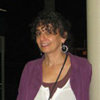
Job Title: Professor, International Development Job Duties: I teach undergrad and grad international development courses in two main areas: environment and development, and economic globalization and development. The latter focuses on global-local links - for example, the impact of investment or of trade on the ground in economic, environmental and social terms. I am very lucky because what I teach is related to my research and to my policy and advocacy work. I care about these issues passionately, as do my students. Read more. GETTING INK 
Professor Jordan Tama's op-ed " Sorry, Senators. An independent panel is the best way to investigate Benghazi." appeared in the Washington Post, Nov. 16. Read more. INTELLECTUAL CONTRIBUTIONS 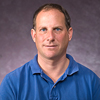
Professor Dan Schneider participated in a panel event, "The Law of Cyber Warfare: Can the Current Legal Regime Hack It?" at AU's Washington College of Law on Nov. 8. Read more. EVENTS 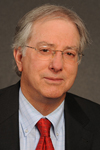
Ambassador Dennis Ross and Dean James Goldgeier will discuss "U.S. Policy in the Middle East in the Next Administration" Monday, Nov. 26, at 2 p.m. in the SIS Abramson Family Founders Room. The event is open to the public. Read more. CONNECT WITH SIS |
|||||||||||||||||
Located in Washington, DC, American University's School of International Service is ranked consistently among the top ten schools of international relations. More than 3,000 students, from undergraduates to PhD candidates, representing 150 countries, are taught by over 100 full-time faculty. SIS's policy-practitioner relationships and global university partnerships help to place 80 percent of its students in internships, and enable 40 percent of graduate students, and 80 percent of undergraduates, to study abroad. The School's faculty, practicing adjuncts and interdisciplinary curriculum prepare graduates for global service in government, non-profits and business. For information regarding the accreditation and state licensing of American University, please visit www.american.edu/academics © School of International Service | American University | Washington, DC |
||||||||||||||||||
